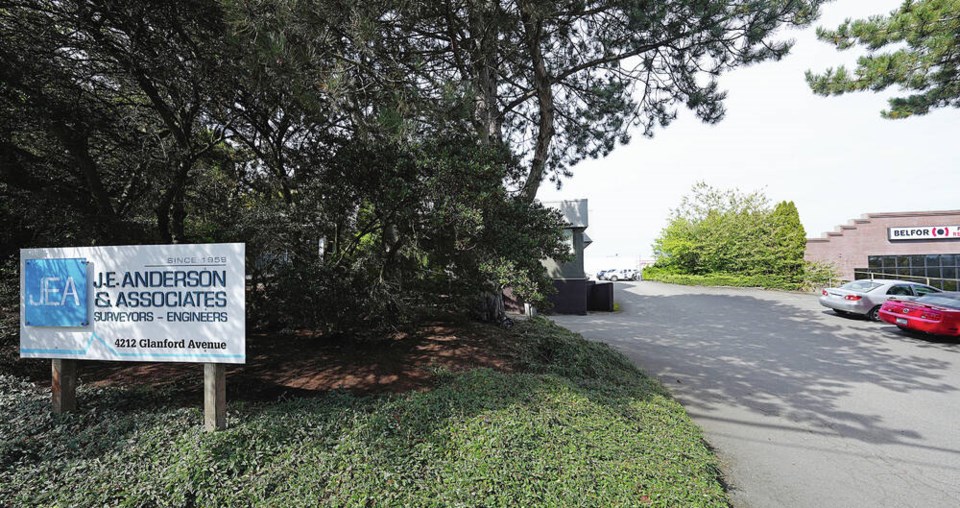A Victoria land surveying and engineering firm is taking B.C. Transit to court to stop the Crown corporation from forcing it out of offices it has occupied for almost 40 years.
J.E. Anderson and Associates, whose office has been at 4212 Glanford Ave. for 38 years, is seeking an injunction to stop Transit from expropriating the space and to allow the firm to remain on site through the end of its lease, or at least until it can find a suitable alternative.
B.C. Transit bought the property in 2020 from Gary Anderson for $1.84 million, with plans for a $48-million operations and maintenance yard to be built over a number of properties in the area.
The sale included an agreement that B.C. Transit would honour a lease allowing Anderson’s company to remain in that space until 2031. That lease, signed in 2016, allowed the firm two five-year options to renew.
In an affidavit filed for the court case, Gary Anderson said the terms of the lease were intentionally favourable to protect the company in the event he sold the property.
“If I had anticipated that [B.C. Transit] would disregard its agreements under the assignment to observe and perform the lease by taking steps to terminate the lease without cause after acquiring the property I would have negotiated the sale differently,” he said in the affidavit. “In the very least I would have required a significantly higher purchase price.”
Anderson said he would have required that B.C. Transit set aside funds to help resettle J.E. Anderson in suitable office space.
Shea Wakefield, general manager at J.E. Anderson, said it’s an unusual situation to have B.C. Transit, which has the power to expropriate land for its operations, expropriating land it already owns. “I mean I get it, this [B.C. Transit] project, they’ve got the budget for it and it’s probably going to happen one way or the other, but the simple fact is we don’t have anywhere to go right now.”
Wakefield said if B.C. Transit is able to force the company out by expropriating the space, it could set a dangerous precedent.
“This would set the precedent that anyone who enters a lease agreement or contract with [B.C. Transit] cannot rely on it to be upheld and will be denied a mechanism for compelling them to perform their obligations,” he said.
Wakefield said if this is how B.C. Transit wanted to proceed, it should have indicated that from the start and the company could have signed a temporary lease.
“This could have all been very straightforward, but they opted not to and they decided to sign themselves into a lease agreement.”
In a statement provided to the Times Colonist, B.C. Transit said it has made no secret it intended to redevelop the property to facilitate efficiency and expansion of the Victoria Regional Transit System.
“We recognize that moving a business can be disruptive and have worked diligently to provide several years’ notice of our need for vacant possession and have offered compensation. The vacant possession date has been pushed back twice during this period of negotiation, allowing more time for the tenants to put arrangements in place,” it said.
“As a Crown corporation, we have a responsibility to abide by what is reasonable under the applicable statutory requirements when negotiating ‘compensation’ for an early lease exit and if agreement cannot be reached, the amount of compensation payable will be determined by the court if pursued by the tenants.”
B.C. Transit said it could not comment further, as the matter is now before the courts.
The Crown corporation has previously indicated it needed possession of the property before the end of this year and that demolition of the existing buildings would start in 2025.
If this case does not go J.E. Anderson’s way, Wakefield said they would definitely be left scrambling.
“We have gone to fairly great lengths to try and accommodate [B.C. Transit]. If we can reasonably find somewhere to go that allows us to continue the way we have since 1959 and in this location since the mid-1980s, we will,” Wakefield said. “We just want to be able to go about our business.”
In an affidavit filed for the case, Colliers Victoria vice-president Ty Whittaker estimated it would take 18 to 24 months to find suitable space for J.E. Anderson given the need for a mix of industrial and office space, warehousing, storage and parking.
A court date has been set for Sept. 27.
>>> To comment on this article, write a letter to the editor: [email protected]




